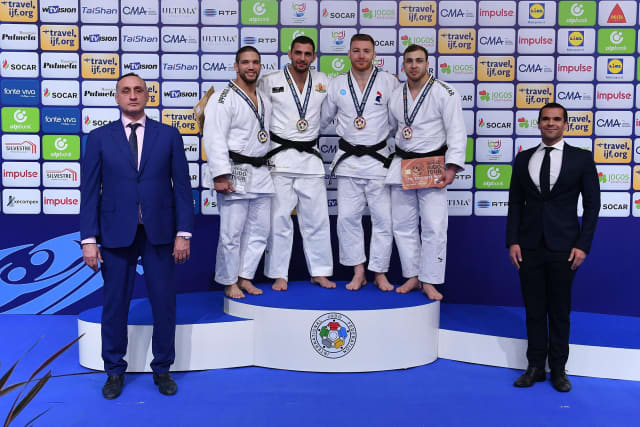The characteristic of great champions like Toth is that even in a day without the finest a timing, they are able to pick up the pieces at the right time to reap victories. There was still a challenging match to come in the final against a judoka that we like a lot, since on good days, his judo can be varied and dynamic. At 28, Ivaylo Ivanov (BUL) has a good track record, having already climbed on a WJT podium fourteen times, yet here in Portugal, he was not among the favourites. Ivanov is still missing a medal at a major championship though; maybe someday. In the meantime, he was the second man to qualify for the final, to meet Toth.
Within the first minute, we witnessed a shoulder throw attempt from Toth, followed by the copy-pasted version for Ivanov for no score but with an immediate combination on the floor for an immobilisation. Everyone thought this was the end but Toth escaped just before the ten second mark. So, still nothing was inscribed on the scoreboard. During the next sequence, Ivanov dropped within the blink of an eye under the centre of gravity of his opponent; a seoi-nage, a flying Toth and an ippon. Ivanov won the gold and was definitely the strongest. It's interesting to underline that this is his fourth medal in a grand prix but the first one in his new weight category on the World Judo Tour.
Wonderful sportsmanship shown by these 2 titans of the -90kg category - a fine example of our sports! Gold for Bulgaria! 🇧🇬
— Judo (@Judo) January 29, 2023
Follow the action at https://t.co/Gupw1a0ll6 📺#JudoPortugal #Judo #Portugal #Sport #Olympics #RoadToParis2024 #Judo #OlympicQualifiers pic.twitter.com/WL2yhSvIde
In pool B, we were waiting impatiently for the return to the highest level of the Olympic mixed team champion, Axel Clerget (FRA). Away from the tatami for a few months due to an injury, he could experience the sensations of competition again today. Two things should be noted. First of all, he seemed in pretty good shape, always on the offensive, constantly pushing and advancing on his opponent but we also noticed that there still lacked a few automatisms when it came to the refereeing rules. This caused him to be penalised for kumi-kata breaks that could probably have been avoided, with a few more high-level competitions; nothing alarming, on the contrary, for Clerget. It's all part of the adjustment. In any case, we found him participating in the first match for a bronze medal, against Darko Brasnjovi (SRB).
Clerget started with his usual high tempo, based on a very strong and powerful kumi-kata, a perfect straight posture and little ashi-waza moves to open the way to opportunities. The first one came with a tremendous makikomi for waza-ari, followed with an immobilisation for not for long enough to score again. There was only 30 seconds left on the clock as the match flew away very fast. During this thirty seconds Brasnjovi really tried to push Clerget, but the experience of the French champion did the rest. Axel Clerget, who was heavily supported by his family and especially his son, enjoyed a very well deserved medal.
The second match for bronze was between Roland Goz (HUN) and Didar Khamza (KAZ). Goz scored a first waza-ari with a neat change of direction. Left-handed, the Hungarian was waiting and waiting, until he operated a full rotation to throw with a right-handed seoi-nage that was close to being an ippon. On the other side, Didar Khamza was trying to install his kumi-kata but with no intention to throw. In the end, controlling everything until the gong, with a shido-free scoreboard and a waza-ari, Roland Goz, 23 years old, won his first medal in a grand prix and the second for Hungary in the category; a job well done!









